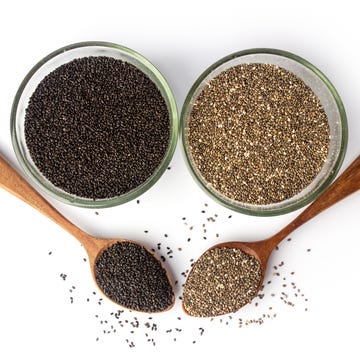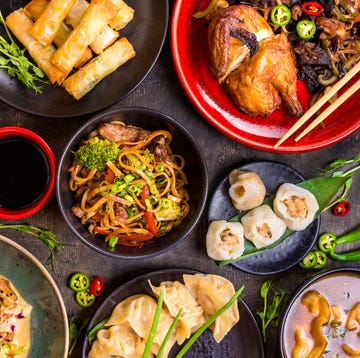1Fish (with the Skin!)
 Bill Boch//Getty Images
Bill Boch//Getty ImagesNext time you're eating a salmon dinner, you might want to leave the skin on, suggests Moore. Fish, in general, is already a great option as it's rich in the amino acids needed to produce collagen. But ever wonder why a fish's skin is so smooth after you remove the scales? That's because there's a high concentration of Type I collagen, which accounts for the majority of collagen in skin.
2Red Bell Peppers
 rumena//Getty Images
rumena//Getty Images"Vitamin C is one of the primary nutrients involved in collagen synthesis," says Moore, and red bell peppers are chockfull of it. This isn't to hate on our green and yellow varieties, of course. Red peppers are just super ripe green peppers, while yellow peppers are somewhere in the middle. Each have vitamin C. But the older the pepper gets, the more vitamin C it contains, making the red ones even more useful for that collagen factory.
Advertisement - Continue Reading Below
3Tomatoes
 Alexander Spatari//Getty Images
Alexander Spatari//Getty ImagesTomatoes — especially sun-dried tomatoes — also contain high levels of the vitamin C needed for collagen production. They also contain antioxidant lycopene, which is known to protect skin from sun damage and collagen breakdown. Toss these in a salad or place them on top of your pasta to add a little tang to you plates. Grape tomatoes also make a healthy grab-and-go snack on their own.
4Bone Broth
 bhofack2//Getty Images
bhofack2//Getty Images Advertisement - Continue Reading Below
5Berries
 Lew Robertson//Getty Images
Lew Robertson//Getty Images Strawberries, blackberries, raspberries, blueberries ... all of them contain a great dose of vitamin C that's works wonders on the skin. They also have ellagic acid which fights against UV ray damage, according to research.
6Beef
 Dennis Gottlieb//Getty Images
Dennis Gottlieb//Getty ImagesIf you're about to bite into a burger or sink your teeth into a juicy steak, know that piece of meat is high in zinc. Zinc is one of the essential ingredients to collagen production, says Moore. What's more, beef contains three of the amino acids that make up collagen: glycine, proline, and hydroxyproline.
Advertisement - Continue Reading Below
7Citrus Fruits
 Martin Poole//Getty Images
Martin Poole//Getty ImagesHere's another fun fact about vitamin C: this nutrient is what helps link amino acids during collagen production. People often consider citrus fruits to be the kings and queens of vitamin C. But other fruits and veggies have been found to carry more. Still, one medium-sized orange has about 70 mg of vitamin C. That's respectable considering the recommended daily value for an adult woman is 75 milligrams.
8Eggs
 Lartal//Getty Images
Lartal//Getty ImagesScramble 'em. Fry 'em, Boil 'em. Just remember to keep the yolk. That gooey yellow center contains collagen that will help keep your hair nice and shiny. The egg whites also carry the animo acids needed to make collagen.
Advertisement - Continue Reading Below
9Dark Leafy Greens
 corners74//Getty Images
corners74//Getty ImagesGreens like spinach, kale, collard greens, and rainbow chard are known for carrying all sorts of nutrients — including that oh-so-desirable vitamin C. But the nutrient that makes these veggies green is just as important to keeping your skin healthy. Chlorophyll, the source of the pigment, may increase the amount of procollagen (the precursor to collagen).
10Chicken
 Anfisa Kameneva / EyeEm//Getty Images
Anfisa Kameneva / EyeEm//Getty ImagesLike beef and fish, chicken has all of the animo acids required to make collagen. In general, if you're a meat eater who eats a balanced plate of protein and vegetables, you're probably giving your skin a good dose of what it needs to stay as smooth as possible.
Advertisement - Continue Reading Below
11Legumes
 Patrizia Savarese//Getty Images
Patrizia Savarese//Getty ImagesLegumes contain many minerals and proteins that will help your skin. Chickpeas are especially great for collagen synthesis because they are rich in zinc and vitamin C.
12Oysters
 David Marsden//Getty Images
David Marsden//Getty ImagesOnce you read this, you might find yourself casually slurping these at home on the couch instead of waiting for that rare occasion you go out for oysters and cocktails with your friends. Oysters contain high levels of copper which, according to Moore, is another mineral that helps us to create collagen.
Advertisement - Continue Reading Below
Advertisement - Continue Reading Below
Advertisement - Continue Reading Below

























